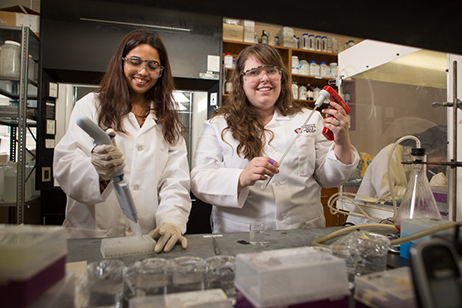Seeking a Genetic Marker for Ascites

University of Arkansas cell and molecular biology graduate students Shatovisha Dey and Katy Tarrant are conducting research on a study to identify a genetic marker for resistance to ascites, a disease found in broiler chickens.
FAYETTEVILLE, Ark. – Researchers at the University of Arkansas, the U of A System Division of Agriculture and the University of Delaware have received federal funding to identify a genetic marker for resistance to the metabolic disease ascites in commercial poultry.
Douglas Rhoads, a professor in the Department of Biological Sciences, is leading the study with collaborators Nick Anthony and Byung-Whi Kong in the U of A’s Department of Poultry Science and Carl Schmidt at the University of Delaware. The U.S. Department of Agriculture’s National Institute for Food and Agriculture this month awarded the researchers a three-year, $467,000 grant for the study.
“Although commercial poultry are more efficient and healthier than in the past, we are working to find ways to further improve health,” said Michael Kidd, director of the Tyson Center of Excellence for Poultry Science at the UA Division of Agriculture.
Researchers at the U of A have been studying ascites – a fluid accumulation that can occur in the abdominal cavity of chickens – for two decades, and Anthony’s group has been breeding chickens for genetic resistance and susceptibility to ascites for more than 15 years.
“We have mapped regions of the chicken genome that influence disease incidence,” Rhoads said. “We have identified an ascites susceptibility region and how genes in this chromosomal region interact with gene networks. Our hypothesis is that this region can be used to increase ascites resistance.”
Identifying a validated marker for genetic selection in ascites resistance has implications for human health, Rhoads said.
“We have been learning that high blood pressure in chickens is similar to particular kinds of hypertension in humans,” he said. “Chickens have lesions in their lungs when they are developing ascites that look exactly like lesions we see in pulmonary arterial hypertension in humans.”
Four students in the U of A’s interdisciplinary graduate program in cell and molecular biology are contributing to the study: Katy Tarrant, Shatovisha Dey, Khaloud Alzahrani and Alia Parveen. Two students within the Center of Excellence for Poultry Science, Alex Gilley and Sara Orlowski, are also contributing to the project.
Rhoads, Anthony and Kong conduct research in the Center of Excellence for Poultry Science in the Dale Bumpers College of Agricultural, Food and Life Sciences.
___
About the Division of Agriculture: The Division of Agriculture is a statewide entity of the University of Arkansas System and includes the Arkansas Agricultural Experiment Station and Cooperative Extension Service. It has offices on five of the University of Arkansas System campuses as well as five research and extension stations and eight branch experiment stations.
About the University of Arkansas: The University of Arkansas provides an internationally competitive education for undergraduate and graduate students in more than 200 academic programs. The university contributes new knowledge, economic development, basic and applied research, and creative activity while also providing service to academic and professional disciplines. The Carnegie Foundation classifies the University of Arkansas among only 2 percent of universities in America that have the highest level of research activity. U.S. News & World Report ranks the University of Arkansas among its top American public research universities. Founded in 1871, the University of Arkansas comprises 10 colleges and schools and maintains a low student-to-faculty ratio that promotes personal attention and close mentoring.
Topics
Contacts
Douglas Rhoads, professor, Department of Biological Sciences
J. William Fulbright College of Arts and Sciences
479-575-7396,
drhoads@uark.edu
Chris Branam, research communications writer/editor
University Relations
479-575-4737,
cwbranam@uark.edu
Dave Edmark, interim coordinator
Division of Agriculture Communications
479-575-6940,
dedmark@uark.edu
Headlines
Four Students Named Goldwater Scholars; Two Earn Udall Honorable Mentions
Four U of A students have received the prestigious Goldwater Scholarship, an award for top students in mathematics, science, and engineering.
Cross-Campus Collaboration Culminates in New Outdoor Geological Installation
Grand opening event to celebrate the new GeoLab installation at the U of A’s Gearhart Hall courtyard is set for May 3. The installation will be open to the public year-round.
First Students to Use Online Degree to Hone Nursing Leadership, Elevate Patient Care
Hanna Baxendale and Wendi Kimbrell will begin coursework in the Doctor of Nursing Practice-Executive Master of Business Administration program offered by the Eleanor Mann School of Nursing and Walton College.
Join the Office for Sustainability on a Final Cruise to Campus
Cruise to Campus Wednesdays have fostered a gathering space for individuals interested in biking to campus. Drop by the Old Main Lawn from 7:30-10 a.m. Wednesday for coffee, something to eat and conversation.
Fay Jones School Student Ambassador Program Gives Voice to Design Students
The student ambassador program at the Fay Jones School of Architecture and Design is built to connect top design students with their school, its alumni, its future students and others inside and outside the school.




